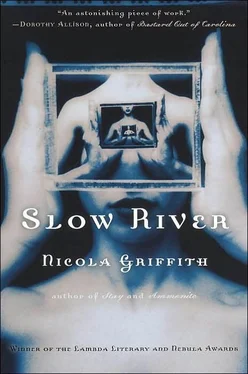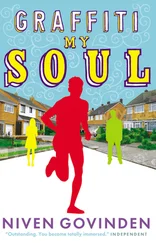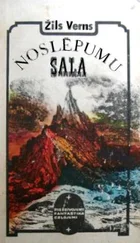It takes nearly three days to get them both to sign off on the budget changes, and even then she has to promise to “forget” to post the changes with the relevant Kirghizi departments.
“Is it always like this?” she asks that evening in Marley’s tent.
“Usually worse,” he says. “It’s impossible to get everyone to agree. To get things to move and change, we need to bend the rules a little. Some of us enjoy it.”
“Do you?”
“No, but your uncle Willem—”
“Just call him Willem. You know he hates being an uncle.”
“—but Willem, I think, gets a secret pleasure from the wheeling and dealing. As does your sister Greta.”
“Greta?” Lore is astonished. “She always seems like such a…” She hunts for a polite synonym for nonentity.
“Greta is a much more powerful force in this company than most people realize,” Marley says seriously. “Your future might be smoother if you bore that in mind.”
Lore knows that Marley is trying to tell her something but she has no idea what. “What about the rest of my family?”
“Katerine does not wheel and deal. She cuts to the heart. That’s her enjoyment.”
“And my father”
“I don’t know what your father enjoys.” Nor does Lore, these days.
Although she is up the next day well before dawn, she does not want to be perceived as inexperienced and overeager. She spends an hour walking the desert. She hears no birds, sees no rodent tracks, senses no slither-and-hide of lizard or snake. Here, the desert is barren.
When it has been light for nearly an hour, she calls together her managers.
The solution is easy enough in theory—they will use an advanced oxidation process, a combination of ultraviolet, hydrogen peroxide, and titanium oxide to break the dioxins down to relatively harmless weak acids and carbon dioxide, which can then be further remediated with biological agents—but in practice, the task is massive. There will be factors unanticipated simply because of the scale. Lore reminds her managers of this and tells them that every detail, no matter how small, must be overseen, whether by them or by trusted assistants. Meticulousness might not eliminate problems, but it will reduce them. She outlines the preliminary schedule of shifts and leave for the next few months, but warns them this may have to change when they hit snags. She orders herself a new project tent, one with more amenities; she does not mean to leave the project HQ until everything is online.
It takes five months to get the vast UV-reflecting troughs built. It should have taken two, but the glass coating on the contractors’ first load is substandard, and has to be done again. Then there is some kind of ethnic conflict between the Muslim Kirghizians and their Orthodox neighbors, and many of the local workers are conscripted. Lore has dinner with the minister and manages to get her labor force exempted from the draft.
“Is it always as bad as this?” becomes Lore’s standard question.
“Usually worse,” comes Marley’s smiling reply. He is always ready with advice, both theoretical and practical, and Lore sighs and goes back to negotiating, or drawing, or simply shouting, whichever is most expedient. Half a year later, the pipeline is done, stretching south across the Kirghizi desert mile after mile to the Aral Sea. Lore is fascinated by it. She watches the first water hiss through the special glass tubes along the center of the troughs and begin to bubble as the absorbed UV changes the toxic dioxins to aldehydes, then carboxylic acids, and finally carbon dioxide. It will take forty years, but she has begun it.
“Did you know,” she tells Marley that night, “that all this, this mess, the ruin of a whole ecosystem, a whole generation of people, was practically for nothing? About eighty percent of the water carried by the original canals away from the Syr and Amu Darya never even reached the cotton fields! They were criminally inefficient. The canals were made of unlined sand. Can you believe that? Sand!”
The grandiose insanity of the initial scheme to turn a desert into cotton fields outrages Lore. She forces herself to read every study that has been made of the suffering population. The water minerals are running at 1.5 grams per liter, thirty-four percent of adults and sixty-seven percent of children suffer respiratory illness, and seven out of ten inhabitants have hepatitis. All because some maniac thought that climate, geography, and ecology were amenable to ideology.
The sheer scale of that idiocy prods her into a fever. She has to find some way to make a statement, create some monument to remediation as powerful, as awe-inspiring as that lunacy. So she squeezes the budget and builds tower after tower—artificial waterfalls. Water falls hundreds of feet, brilliant with the reflected light of bank after bank of alien-looking heliostats that focus on the cascades the power of sixty suns, enough UV energy to initiate the reaction of organic pollutants to CO, in less than forty-five seconds, the time it takes for the water to fall from the top to the bottom.
Mile after mile of these artificial waterfalls glitter in the desert, carbon dioxide fuming from their bases like smoke. Lore dreams of them at night, and wakes in the morning filled with their imagery, satisfied in a way she has never found before—not from sex or food, not from exercise or books or making films. From her mind, her planning, has come this scheme to change a tiny portion of the world. In forty years these rusted hulks will be gone, the birth pathology rate will fall from its current horrendous forty-one to something more normal, and people will fish again in the Aral Sea.
Ruth and Ellen owned a tiny house in a row of sixteen, all painted bright, primary colors. They faced what had once been a brickyard. The yard had closed down unexpectedly four weeks after they had signed the mortgage, making their home instantly worth thousands more. The yard, Ellen told me as she took my coat, was being converted into a seed nursery by one of the big garden-center chains.
Ruth showed me the living room—small, but with ingenious shelving—then led me into the big kitchen. Ellen followed but said nothing.
There was a bathroom extension, compact and rather chilly, and a back door that led out onto several square feet of concrete.
“We’re going to turn it into a patio or something, but we need to get the inside of the house fixed up first.”
“It looks fine to me.” And it did: clean, bright, open.
“You should have seen it before. Upstairs is still a bit of a mess.”
Ellen handed me a big glass of cold white wine. I drank it as I followed Ruth to look around upstairs. Ellen filled it again for me when we came down.
We sat in the bay window of the living room, at an old table with scarred legs covered with a cheerful cloth. Handmade stained-glass shades colored the lamplight, dimming it enough, so that I could barely see the thin patches in the chenille curtains. The room felt warm and vibrant and jewel-like, and I wondered if they knew how much I envied them.
Ellen brought in soup. We started to eat. I did not know what to say. I had hurt these two a while ago, yet here I was, eating their food.
I cleared my throat, waved my spoon at the walls. “Do you think these colors would suit my flat?”
“Tell us what it’s like.” There were rich shadows under Ruth’s cheekbones, along her jaw.
“Empty. I mean, bare. Long and narrow, low ceiling. Strange angles at the roof and corners.” My soup was gone. I refilled my wineglass, just to have something to do with my hands. “A high window, but wide. From my bed it looks like the horizon a long, long way off.” That surprised me, but they weren’t giving me funny looks. I was encouraged. “In the late afternoon and early morning, the light slants in and sort of washes the walls. Sometimes it’s like stumbling out of a dark tent to desert sunshine, to sand stretching away in the distance.” I held my wineglass up until the light turned it gold. “I want the air to feel as though it’s this color. Sunshine on sand.” I felt very pleased with myself. “Yes. A sort of sandy peachy color.”
Читать дальше












